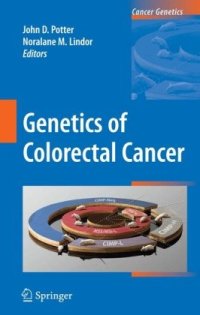
Ebook: Genetics of Colorectal Cancer
Author: John D. Potter MD PhD David Hunter (auth.) John D. Potter MD PhD Noralane M. Lindor MD (eds.)
- Genre: Biology // Genetics
- Tags: Cancer Research, Human Genetics, Oncology
- Series: Cancer genetics
- Year: 2009
- Publisher: Springer-Verlag New York
- City: New York
- Edition: 1
- Language: English
- pdf
The last 20 years have seen a remarkable increase in knowledge of the etiology of colorectal cancer. At least three aspects are much clearer. First, known environmental agents and behaviors have been identified that increase risk (for example, diets high in meat, obesity, and smoking ) or decrease risk (for example, diets high in plant foods, aspirin, and physical activity) of colorectal cancer. Second, germline mutations in specific genes have been identified for the major inherited syndromes involving colorectal cancer (FAP, Lynch Syndrome, Juvenile Polyposis, MYH-Associated Polyposis, Li-Fraumeni Syndrome) as have variants of genes that modify the risk associated with the known environmental agents. Third, the specific tissue, cellular, and molecular disturbances that characterize the progression to different subtypes of colorectal cancer have been recently described. Genetics of Colorectal Cancer provides the most up-to-date information in each of these areas.
Genetic susceptibility refers to how variations in a person s genes increase or decrease his or her susceptibility to environmental factors, such as chemicals, radiation and lifestyle (diet and smoking). This volume will explore the latest findings in the area of genetic susceptibility to gastrointestinal cancers, focusing on molecular epidemiology, DNA repair, and gene-environment interactions to identify factors that affect the incidence of GI cancers. Topics will include germline susceptibility, including Mendelian patterns of inheritance and gene-environment interactions that lead to cancer etiology.